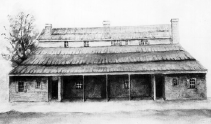News
February seminars
3 Feb: Coming to grips with FamilySearch, WEA
10:00am
17 Feb: Tracing your English ancestors, Tea
Tree Gully Library 1:00pm
World Vital Records expands
World
Vital Records has announced a major expansion to be launched
on 4 Feb 2008. Their Australian partner will be Archive CD Books (Aust)
a branch of Gould Genealogy. Those that subscribe pre-launch can secure
a significant discount.
Egypt
 We had a wonderful time in Egypt for three weeks in January but now it
is back to work. Here is Graham Jaunay (the over-dressed one on the left)
rowing a becalmed felucca upstream on the Nile at Luxor...
We had a wonderful time in Egypt for three weeks in January but now it
is back to work. Here is Graham Jaunay (the over-dressed one on the left)
rowing a becalmed felucca upstream on the Nile at Luxor...
In this issue:
News
•
February seminars
• World Vital Records
• Vacation
SA
courts and their records
![]()
Adelaide
Proformat
5 Windana Mews
Glandore SA 5037
Australia
Tel: +61 8 8371 4465
Fax: +61 8 8374 4479
proformat@jaunay.com
Services
• Research
• Drafting charts
• Locating documents
• Seminar presentations
• Writing & publishing
• SA lookup service
• Ship paintings
South
Australian courts and their records
The courts
The English model was adopted by the SA Courts System in the 19th century
and to this day reflects the same structure.
 In
spite of the old adage that justice needs to be seen to be done,
the records of the higher courts in South Australia can be difficult to
access. Despite claims to the contrary, the closure of court records seems
to be a recent phenomenon. In the early 1990s I had no trouble accessing
records of the Supreme Court when compiling the booklet on South Australian
convicts sentenced to transportation. The same records are now largely
closed.
In
spite of the old adage that justice needs to be seen to be done,
the records of the higher courts in South Australia can be difficult to
access. Despite claims to the contrary, the closure of court records seems
to be a recent phenomenon. In the early 1990s I had no trouble accessing
records of the Supreme Court when compiling the booklet on South Australian
convicts sentenced to transportation. The same records are now largely
closed.
Pictured:
The Supreme Court building in Whitmore Square 1840 Town Acre 61 [Graham
Jaunay, SA convicts sentenced to transportation 1837–1851,
1995 p12 ]
The work of all arms of government should as a matter of principle be
conducted openly and in public so far as possible. While I have no issue
with this aspect as far as the courts in Australia, the ability to access
information is not so open. In my view this information should generally
be accessible unless there is good reason for withholding particular information.
When I undertook this research the material was freely available at State
Records of SA, now an application and the payment of fees has to be made
to the court just to determine if one can access the records! If the Courts
Authority denies access then the researcher has to make an application
to a judge!
Not all courts in SA have restricted access to their records.
The following state courts currently operate in South Australia:
1. Supreme Court
2. District Court – established in 1969 to relieve the work load
of the Supreme Court.
3. Environment Resources Development Court
4. Magistrates Court (formerly known as the Police Court)
5. Youth Court
6. Coroners Court
7. Industrial relations Court
8. Drug Court – an arm of the Magistrates Court
9. Family Violence Court – an arm of the Magistrates Court
Most of these courts are modern and will not interest the family history
researcher.
The court records of the greatest interest are those of the Supreme Court
of South Australia that is a court of both law and equity. It deals with
the more important civil cases and the most serious criminal matters.
In its appellate jurisdiction, the Supreme Court reviews and determines
errors which may have occurred in other courts of the State and interprets
and expounds the law for the guidance of other courts. The Supreme Court
is the court which has the exclusive jurisdiction in SA to make orders
in relation to the validity of a will of a deceased person, the appointment
of an executor or an administrator, and the administration of a deceased
estate. The Probate Registry is the registry of the court which deals
with applications for grants of probate or administration and other related
matters. The registry keeps a register of probates and administrations
granted by the court.
To access criminal and civil records the process to follow starts at State
Records of SA with a search through the series lists to see what is available.
You may be able go directly to the Supreme Court Registry at 1 Gouger
Street Adelaide and search the indexes of court files. Experience suggests
that both venues need to be approached to ensure a full coverage. It is
only when you make an application to access the records that you will
know whether they are closed and the associated process and costs to access
them. The Probate Registry is outside this process and the index of Proven
Wills and Letters of Administration are readily available at the Registry
(and other places) and any one can purchase this material with little
effort.
The Library Service is responsible for developing and maintaining libraries
that serve the Supreme Court, District Court, Magistrates Courts, Youth
Court and Environment, Resources and Development Court. The Supreme Court
Library is located on the second floor at 1 Gouger Street, Adelaide. Enter
through the courtyard on Gouger Street between the main Supreme Court
building and Jeffcott Chambers. Of particular interest are Supreme Court
judges' notebooks dating from the 1840s. The notebooks are often the only
surviving record of some court proceedings as a number of early records
were subjected to sampling a number of years ago. The library is open
to the public between 9:00am and 5:30pm Monday to Friday.
The District Court is the principal trial court in South Australia. The
Court’s work is in four areas: civil, criminal, administrative and
disciplinary, and criminal injuries. The District Court can hear criminal
matters, except for offences related to murder and treason. It also has
jurisdiction over criminal injuries compensation claims. The District
Court also deals with administrative and disciplinary matters through
statutory tribunals. The work of this court is largely outside the interests
of most family historians.
The Magistrates Court in SA dates from late in 1837, when Mr Henry Wigley
was appointed as Resident Magistrate of the new settlement. The Magistrates
Court has had a number of homes since then, including Gilles Arcade, near
the old Queen’s Theatre, and the building that now houses the Supreme
Court, on Gouger Street.
In 1843 Governor Grey decided that the Police Commissioner had time to
hear charges of minor offences. At first he heard only charges under the
several Police Acts but gradually, sitting with two Justices of the Peace,
he undertook more and more of the Resident Magistrate's work ultimately
giving rise to the court being termed the Police Court.
The Magistrates Court has a criminal and civil jurisdiction. In its criminal
jurisdiction, the Magistrates Court deals with summary offences, which
may be dealt with by a fine, imprisonment of up to two years, community
service or a good behaviour bond. In its civil jurisdiction, it hears
matters seeking damages of up to $80,000 as a result of motor vehicle
accidents, or up to $40,000 for general claims.
Local Court is a now defunct term relating to courts at this level conducted
outside of Adelaide.
The records of the court date from 1847. As with the Supreme Court, the
researcher may find access barriers to these records.
The researcher may at times come across a reference to a Sheriff's Court.
In SA the Sheriff never conducted a court. The Sheriff acts as executive
officer of the courts. From 1870 the Sheriff was accorded the responsibility
of all gaols and the custody of all imprisoned debtors and criminals.
This responsibility remained with the Sheriff until 1965. Currently the
Sheriff has the responsibility of enforcing court orders that require
the recovery of money, the seizure of property, the sale of a debtor’s
property and the arrest of people. The Sheriff is also a Marshall within
SA in respect to the High Court of Australia and the Federal Court. In
undertaking this duty, the Sheriff must act with complete independence
and propriety.Note that records generated by the Sheriff and Correctional
Services Department (GRG 54) are not restricted.
The records
Supreme Court: State Records of SA Series GRG 36 (restricted)
• GRG 36/1 Indictments 1837–1924
• GRG 36/8 Depositions
1839–1853
• GRG 36/3 Affidavitts 1837–1892
• GRG 54/10 Sentence Book 1905–1923
• GRG 54/9 Writ Books 1837–1850; 1921–1955
Adelaide Local Court: State Records of SA Series GRG 3 (restricted)
• GRG 3/2 Minute Books 1849–1869
• GRG 3/2 Minor offences 1883–1932
Country and Suburban Local Courts: State Records of SA Series GRG 4 (restricted)
• GRG 4/132 Record of proceedings 1842–1851
• GRG 4/1–113, 119–127, 130–1, 168
various courts with dates according to the court
• GRG 4/117 Register of pension claims 1909–1960
(open)
• GRG 4/118 Registered chn with no vaccination certificate
1884–1886
Adelaide Magistrates Court: State Records of SA Series GRG 65 (restricted)
• GRG 65/1 Police Court Minutes 1847–1936
• GRG 65/7 Police Court Summons and warrants 1881–1900
•
GRG 65/7 Police Court Files 1904–1944
Inquest and coronial records
• GRG 1/91 Burial Orders 1926–1971
• GRG 1/27 Inquest files 1867–1976 – also
police stns and inquest registers listed in GRG 5
Insolvency Courts: State Records of SA Series GRG 66, 68
• GRG 66/3 Index 1841–1923
• GRG 66/6 Schedule of estates 1841–1931
• GRG 68 Regional courts with varying date ranges